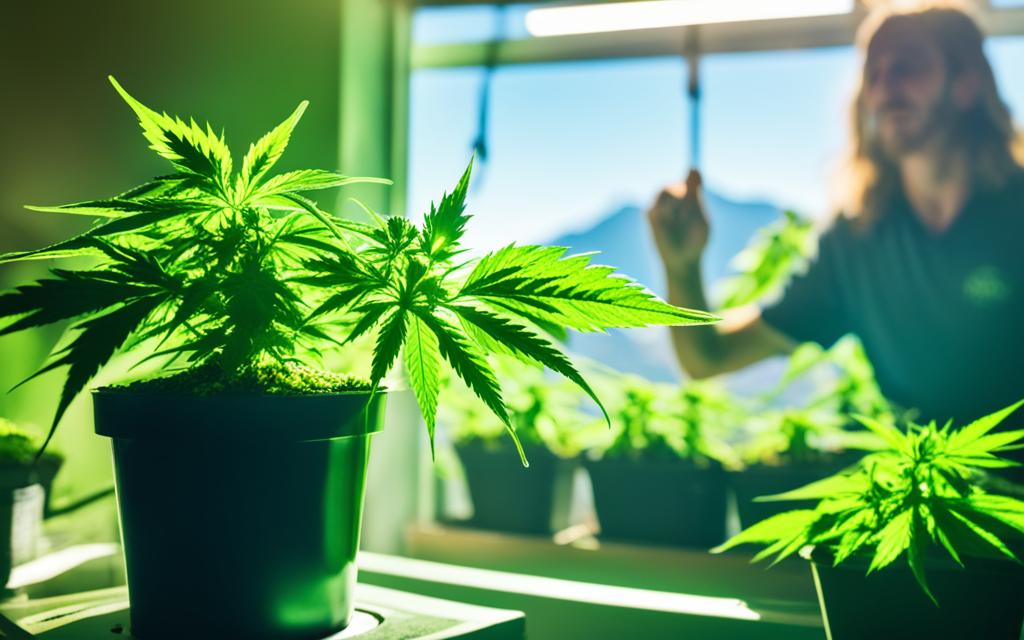The legalization of cannabis cultivation in Costa Rica has been the subject of much discussion and debate, specifically home-grown cannabis. With the introduction of a new bill by the Frente Amplio party, the prospect of individuals being able to grow cannabis plants in their own homes for personal use is becoming a reality. This proposed amendment aims to address the issues surrounding the illicit market and provide a legal avenue for individuals to obtain cannabis.
Currently, Costa Rica has strict laws regarding cannabis cultivation, prohibiting it for commercial purposes as stated in Article 58 of the Law on Narcotic Drugs and Psychotropic Substances. However, this bill seeks to change that by allowing individuals above the age of 18 to grow a maximum of 20 female cannabis plants within the privacy of their own residences.
Key Takeaways:
- The Frente Amplio party in Costa Rica has introduced a bill to legalize the domestic cultivation of cannabis for personal use.
- If passed, individuals above 18 years old would be permitted to grow a maximum of 20 female cannabis plants within their private residences.
- The proposed amendment aims to counter the illicit market and provide users with a legal avenue to obtain cannabis.
- Violators found cultivating more plants than allowed could face fines.
- The bill also advocates for informative campaigns promoting responsible use of cannabis.
Current Cannabis Laws in Costa Rica
Currently, cannabis cultivation for commercial purposes is strictly prohibited in Costa Rica according to Article 58 of the Law on Narcotic Drugs and Psychotropic Substances. This legislation also imposes penalties on individuals engaged in cannabis cultivation, even for personal use.

This image depicts the current restrictions and laws surrounding cannabis cultivation in Costa Rica.
The Law on Narcotic Drugs and Psychotropic Substances
“Article 58: The illicit cultivation of any plants that produce narcotic, psychotropic, or dangerous substances shall be punished by imprisonment for a period of four to ten years.”
Penalties for cannabis cultivation in Costa Rica
| Violation | Penalty |
|---|---|
| Cannabis cultivation for commercial purposes | Imprisonment for 4 to 10 years |
| Cannabis cultivation for personal use | Potential penalties as stipulated by the law |
The existing legislation in Costa Rica makes no distinction between commercial and personal cultivation, treating both offenses as illegal. Violators face significant legal consequences, including imprisonment and other penalties.
The proposed bill by the Frente Amplio party aims to amend these laws in order to permit the domestic cultivation of cannabis for personal use.
Rationale Behind the Bill
The Frente Amplio party believes that the legalization of home-grown cannabis cultivation in Costa Rica will bring several benefits to the country. By providing a legal avenue for individuals to obtain cannabis, the party aims to address the needs of certain segments of the population, such as the elderly, who may benefit from cannabis use for medicinal purposes. Additionally, they argue that allowing home cultivation will help combat the illicit market and promote user safety.
The party firmly believes that by legalizing home cultivation, users’ health, human rights, and safety can be safeguarded. They draw parallels with other countries, such as Colombia, where similar legislation has led to a significant reduction in illicit market activities. The success of these measures in other regions serves as a compelling example for Costa Rica to adopt similar approaches and reduce the prevalence of the illicit cannabis market.
Benefits for the Elderly
The legalization of home-grown cannabis cultivation would specifically benefit the elderly population in Costa Rica. Many older individuals may require cannabis for various medical reasons, such as pain management and alleviating symptoms associated with chronic conditions. By allowing them to cultivate cannabis in their own homes, they would have access to a safe and reliable source of medication without relying on the illicit market or expensive pharmaceutical alternatives.
Combating the Illicit Market
The Frente Amplio party aims to combat the illicit cannabis market through the legalization of home cultivation. By providing a legal and regulated avenue for individuals to grow their own cannabis, the party believes that the demand for illegal products would diminish. This reduction in demand would subsequently lead to a decrease in the activities of illicit cannabis producers and distributors, helping to prioritize user safety and reduce the associated risks of purchasing from the underground market.
Legalizing home-grown cannabis cultivation not only provides users with a safer and more secure option but also allows for the regulation and oversight of cannabis production, ultimately benefiting both individuals and society as a whole.
Successful Models in Other Countries
The Frente Amplio party points to the success of similar legislation in other countries, particularly Colombia. The implementation of home cultivation allowances in these regions has led to a noticeable decline in illicit market activities and an overall improvement in public safety. By adopting these models, Costa Rica can learn from the experiences of other nations and pave the way for a regulated and responsible cannabis industry.
By legalizing home-grown cannabis cultivation, Costa Rica has the opportunity to create an industry that prioritizes user safety, reduces the illicit market, and addresses the needs of individuals who may benefit from cannabis use. The proposed bill by the Frente Amplio party offers an alternative solution to combat the illicit cannabis market and promote responsible cannabis cultivation within the country.
Proposed Amendment and Penalties
The proposed amendment by the Frente Amplio party aims to alter the existing cannabis legislation in Costa Rica. If passed, this amendment would authorize the domestic cultivation of cannabis plants for personal use. Under the proposed bill, individuals would be allowed to grow a maximum of 20 female cannabis plants within their private residences. This amendment seeks to provide a legal avenue for individuals to obtain cannabis and combat the illicit market.
If individuals are found cultivating more plants than the maximum allowed, penalties will be enforced. The proposed penalties range from fines equivalent to one to five base salaries. These penalties aim to discourage individuals from exceeding the legal cultivation limits and ensure compliance with the home-grow bill.
To complement the amendment and promote responsible use of cannabis, the bill proposes conducting informative and preventive campaigns. These campaigns would be organized by relevant institutions, such as the Institute on Alcoholism and Drug Addiction, the Costa Rican Institute on Drugs, and the Ministry of Health. These campaigns aim to educate individuals on the responsible cultivation, usage, and potential risks associated with cannabis.
In addition to penalties, the Frente Amplio party advocates for the protection of individuals growing cannabis plants within the parameters of the bill. This protection includes safeguards against plant destruction or criminal sanctions. By providing individuals with legal protection, the bill intends to encourage compliance and prevent unnecessary harm to those abiding by the proposed regulations.
Proposed Amendment and Penalties Overview:
| Proposal | Details |
|---|---|
| Amendment | Authorize domestic cultivation of cannabis for personal use |
| Cultivation Limit | Maximum of 20 female cannabis plants per private residence |
| Penalties | Fines ranging from one to five base salaries for exceeding cultivation limits |
| Informative Campaigns | Conducted by relevant institutions to promote responsible cannabis use |
| Protection for Growers | Safeguards against plant destruction or criminal sanctions |

The proposed amendment and associated penalties aim to strike a balance between providing individuals with the freedom to cultivate their own cannabis and ensuring compliance with regulations. By implementing informative campaigns and protecting responsible cultivators, the Frente Amplio party seeks to revolutionize the cannabis landscape in Costa Rica while addressing concerns related to the illicit market.
Comparison to Other Countries
The Frente Amplio party highlights the success of similar legislation that allows home cultivation of cannabis in other countries, such as Colombia. Implementation of these laws has resulted in a significant decrease in illicit market activities. Costa Rica aims to follow in their footsteps and provide consumers with the opportunity to produce cannabis in the comfort of their own homes, reducing their reliance on the illegal market.
“By legalizing home-grown cannabis, we can empower individuals and regulate the market, leading to improved safety and quality control,” says Minister Rodriguez of the Frente Amplio party.
Colombia’s experience with cannabis cultivation for personal use has shown positive outcomes, including decreased illegal activities and increased consumer accessibility. The introduction of this bill in Costa Rica presents the opportunity for the country to leverage the lessons learned and adopt a similar approach to meet the needs and demands of its citizens.
Benefits of Home-Grown Cannabis
Allowing individuals to cultivate cannabis at home offers several benefits:
- Reduces dependence on the illicit market
- Enhances personal autonomy and freedom of choice
- Improves the quality and safety of cannabis products consumed
- Promotes individual self-sufficiency and self-care
- Provides an avenue to explore cannabis as a hobby or therapeutic activity
By legalizing home cultivation, Costa Rica can harness these advantages and create a more inclusive and responsible cannabis culture.
| Country | Legislation | Impact |
|---|---|---|
| Colombia | The Law on the Single Convention on Narcotic Drugs of 1961 decriminalizes the cultivation of up to 20 plants per household for personal use. | Significant reduction in illegal market activities; increased availability of safe and regulated cannabis |
| Uruguay | The 2013 Cannabis Act legalized the production, distribution, and consumption of cannabis for recreational and medicinal purposes. | Established a framework for a regulated and taxed cannabis market; reduced criminal activity |
| Spain | Allows private cultivation of cannabis for personal use within certain limits, varying across regions. | Increased access to cannabis for personal use; reduction in demand for illegal imports |
Implementing a similar approach to these countries can introduce positive changes in Costa Rica’s cannabis landscape, improving accessibility, safety, and overall market dynamics.
Conclusion
The proposed bill for home-grown cannabis in Costa Rica by the Frente Amplio party has the potential to revolutionize the country’s cannabis industry and pave the way for cannabis legalization. If passed, this bill would offer individuals a legal avenue to cultivate cannabis for personal use, while also aiming to combat the illicit market that currently thrives. Proponents of the bill highlight that it would prioritize users’ health and safety, supporting their right to access cannabis in a responsible and regulated manner.
By allowing home cultivation of cannabis, Costa Rica could experience significant shifts in its cannabis landscape. It has the potential to empower individuals, especially those who may benefit from cannabis for medicinal purposes, and reduce their reliance on the illicit market. Furthermore, it would align Costa Rica with other countries that have successfully implemented similar legislation, resulting in a decrease in illegal activities surrounding cannabis.
Although the bill’s future progress and ultimate adoption are uncertain, its introduction marks a crucial step towards cannabis legalization in Costa Rica. The ongoing discussions and debates around this bill demonstrate the growing recognition of the potential benefits that regulated cannabis cultivation can bring to individuals and the nation as a whole. As the world continues to navigate the complexities of cannabis legislation, Costa Rica’s potential embrace of home-grown cannabis represents a significant milestone in the global journey towards a more progressive and inclusive cannabis industry.



